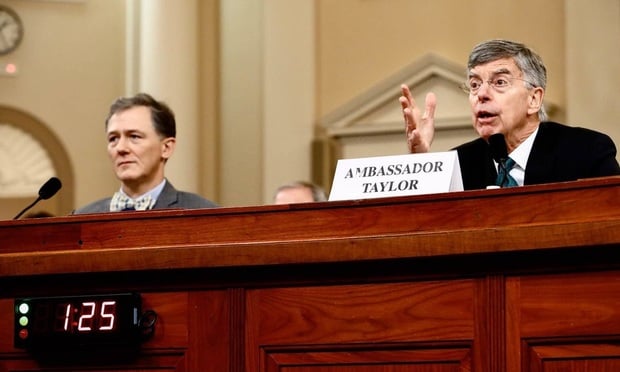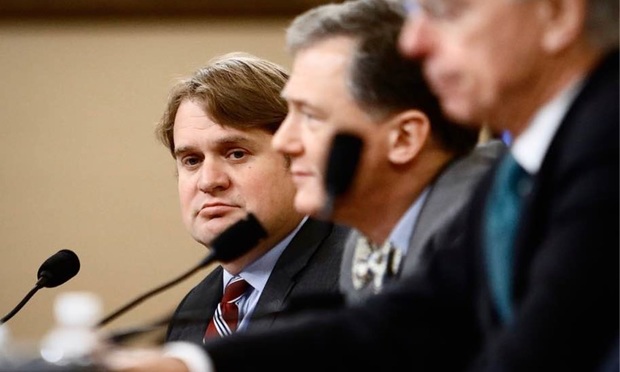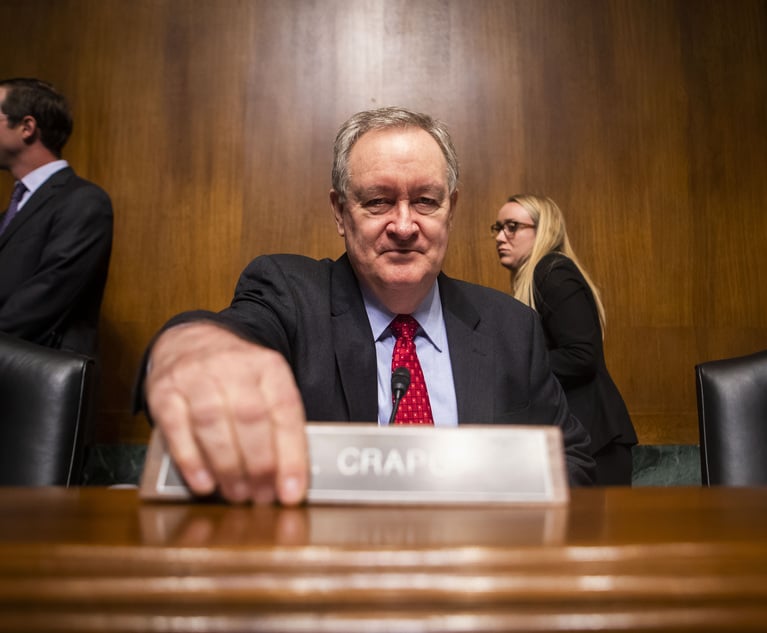House Impeachment Lawyers Duel as Witness Testimony Goes Public
Former federal prosecutor Daniel Goldman led questioning for Democrats, pitting him against Republican counterpart Stephen Castor, a former commercial litigator at Blank Rome. Both lawyers aimed to use witness testimony from William Taylor and George Kent to make broader points.
November 13, 2019 at 03:06 PM
6 minute read
 George Kent, left, and William Taylor, right, testify Wednesday at the House impeachment inquiry. Photo: Diego M. Radzinschi/ALM
George Kent, left, and William Taylor, right, testify Wednesday at the House impeachment inquiry. Photo: Diego M. Radzinschi/ALM
As a former federal prosecutor in New York, Daniel Goldman made a name for himself in the courtroom, notching guilty verdicts against a famed Las Vegas sports gambler and a hit man for a Genovese crime family. His track record left him with a reputation as a strong trial lawyer who could land convictions in closely watched cases.
On Wednesday, he stepped onto a new stage, in a new role with the most imposing target of his career in his sights. For a moment, Goldman was the face of the Democrats' drive to impeach President Donald Trump. From the dais of a House hearing room, behind a placard identifying him as "counsel," Goldman led the questioning for Democratic lawmakers—before they got their turn later in the day—as their impeachment inquiry into Trump first entered a public phase.
Seated to the right of U.S. Rep. Adam Schiff of California, a former prosecutor himself and now chairman of the House Intelligence Committee, Goldman methodically drew out seemingly damning details about Trump's efforts to pressure Ukraine to mount investigations that would advance the president's domestic political interests.
House Democrats subpoenaed William Taylor, a former U.S. ambassador to Ukraine, and the career diplomat George Kent to appear for Wednesday's public hearing. In the hearing room, Taylor was joined by his lawyers from Arnold & Porter Kaye Scholer, and Kent was accompanied by a team from K&L Gates, including partner Andrew Wright.
Other major U.S. law firms have advised current and former diplomatic officials, some of whom are expected to testify in the coming weeks. On Friday, House investigators are set to question Marie Yovanovitch, a former U.S. ambassador to Ukraine who was recalled following an alleged smear campaign by Trump's personal lawyer Rudy Giuliani. Yovanovitch is represented by Lawrence Robbins of the Washington firm Robbins, Russell, Englert, Orseck, Untereiner & Sauber.
Goldman's counterpart, Stephen Castor, a former commercial litigator at Blank Rome and now leading attorney for Republicans on the House oversight committee, used some of his time at the start of the hearing to raise questions about former Vice President Joe Biden and his son Hunter, both central figures in the Republican narrative about corruption in Ukraine.
 K&L Gates partner Andrew Wright, far left, with George Kent (center) and William Taylor. Photo: Diego M. Radzinschi/ALM
K&L Gates partner Andrew Wright, far left, with George Kent (center) and William Taylor. Photo: Diego M. Radzinschi/ALMIn more than a half hour of questioning, Goldman focused on Taylor, pointing to text messages he sent to Trump administration officials raising alarm over an apparent effort to leverage military aid to pressure Ukraine to announce investigations into the Bidens. Trump has denied his engagement with Ukraine was anything untoward.
Taylor, sitting next to retired Arnold & Porter partner Jeffrey Smith, said he recalled how the Trump administration held out a potential White House visit for Ukraine's newly elected president, Volodymyr Zelensky, as it pressed for the country to investigate not only the Bidens but also unproven accusations that Ukraine interfered in the 2016 election to help Hillary Clinton.
Under questioning from Goldman, Taylor said Trump felt "wronged" by the Ukrainians and thought the country "owed" it to him to open investigations into Biden and the 2016 election.
"Did Ukraine owe anything to the United States?" Goldman asked.
"Mr. Goldman, they didn't," Taylor said, adding: "They owed appreciation for the support, and they were getting support, and they appreciated that. But … there was nothing owed to President Trump on that."
Keeping his questions brief, Goldman asked at one point why Taylor was so alarmed by the Trump administration's hold on military assistance to Ukraine.
"It's one thing to try to leverage a meeting in the White House. It's another thing, I thought, to leverage security assistance," Taylor said. "The White House meeting was one thing, the security assistance was much more alarming."
During one exchange, Castor pressed Taylor about what he meant when he described U.S. diplomatic efforts with Ukraine as "irregular." That effort involved Gordon Sondland, the Trump administration's ambassador to the European Union; Kurt Volker, former special envoy to Ukraine; and Energy Secretary Rick Perry.
"This irregular channel of diplomacy, it's not as outlandish as it could be, is that correct?" Castor asked.
Taylor responded, using Castor's language: "It's not as outlandish as it could be."
Republican committee members used their questions to show that Ukraine did, in fact, receive military aid, in the end, and that Ukraine did not announce any investigation of the Bidens. Republicans also portrayed Trump as validly concerned with corruption in Ukraine. Taylor at several points said he was not testifying to take sides in whether Trump should be impeached. That is the job of Congress, Taylor said.
Earlier in the hearing, Goldman asked Taylor why he found it "crazy" that the Trump administration was withholding nearly $400 million in military aid from Ukraine while the country was in conflict with Russia-backed separatists.
"Because that was so important, that security [aid] was so important for Ukraine as well as our own national interests, to withhold that assistance for no good reason other than help with a political campaign made no sense. It was counterproductive to all of what we had been trying to do. It was illogical. It could not be explained. It was crazy," Taylor answered.
The White House said Trump was not watching the impeachment hearing, which press secretary Stephanie Grisham described as "boring." But on Wednesday morning, Trump's Twitter account retweeted more than a dozen posts concerning the proceeding.
Trump told reporters he was too busy to watch the proceedings but remarked, "They're using lawyers that are television lawyers."
Between his stints as a prosecutor and lawyer for House Democrats, Goldman was a television legal analyst.
Read more:
How Major US Firms Prepared House Impeachment Witnesses
House Attorneys Prepare to Go Public in Impeachment Hearings
'Let's Motor Through, Chairman': How Robert Luskin Guided Gordon Sondland
'Barely-Lawyered Temper Tantrum': What Lawyers Said About Cipollone's Letter
16 Conservative Lawyers Say They Support 'Expeditious' Impeachment Inquiry
This content has been archived. It is available through our partners, LexisNexis® and Bloomberg Law.
To view this content, please continue to their sites.
Not a Lexis Subscriber?
Subscribe Now
Not a Bloomberg Law Subscriber?
Subscribe Now
NOT FOR REPRINT
© 2025 ALM Global, LLC, All Rights Reserved. Request academic re-use from www.copyright.com. All other uses, submit a request to [email protected]. For more information visit Asset & Logo Licensing.
You Might Like
View All
Am Law 200 Firms Announce Wave of D.C. Hires in White-Collar, Antitrust, Litigation Practices
3 minute read
Trump's RTO Mandate May Have Some Gov't Lawyers Polishing Their Resumes
5 minute read
Senator Plans to Reintroduce Bill to Split 9th Circuit
Law Firms Mentioned
Trending Stories
- 1Pogo Stick Maker Wants Financing Company to Pay $20M After Bailing Out Client
- 2Goldman Sachs Secures Dismissal of Celebrity Manager's Lawsuit Over Failed Deal
- 3Trump Moves to Withdraw Applications to Halt Now-Completed Sentencing
- 4Trump's RTO Mandate May Have Some Gov't Lawyers Polishing Their Resumes
- 5A Judge Is Raising Questions About Docket Rotation
Who Got The Work
J. Brugh Lower of Gibbons has entered an appearance for industrial equipment supplier Devco Corporation in a pending trademark infringement lawsuit. The suit, accusing the defendant of selling knock-off Graco products, was filed Dec. 18 in New Jersey District Court by Rivkin Radler on behalf of Graco Inc. and Graco Minnesota. The case, assigned to U.S. District Judge Zahid N. Quraishi, is 3:24-cv-11294, Graco Inc. et al v. Devco Corporation.
Who Got The Work
Rebecca Maller-Stein and Kent A. Yalowitz of Arnold & Porter Kaye Scholer have entered their appearances for Hanaco Venture Capital and its executives, Lior Prosor and David Frankel, in a pending securities lawsuit. The action, filed on Dec. 24 in New York Southern District Court by Zell, Aron & Co. on behalf of Goldeneye Advisors, accuses the defendants of negligently and fraudulently managing the plaintiff's $1 million investment. The case, assigned to U.S. District Judge Vernon S. Broderick, is 1:24-cv-09918, Goldeneye Advisors, LLC v. Hanaco Venture Capital, Ltd. et al.
Who Got The Work
Attorneys from A&O Shearman has stepped in as defense counsel for Toronto-Dominion Bank and other defendants in a pending securities class action. The suit, filed Dec. 11 in New York Southern District Court by Bleichmar Fonti & Auld, accuses the defendants of concealing the bank's 'pervasive' deficiencies in regards to its compliance with the Bank Secrecy Act and the quality of its anti-money laundering controls. The case, assigned to U.S. District Judge Arun Subramanian, is 1:24-cv-09445, Gonzalez v. The Toronto-Dominion Bank et al.
Who Got The Work
Crown Castle International, a Pennsylvania company providing shared communications infrastructure, has turned to Luke D. Wolf of Gordon Rees Scully Mansukhani to fend off a pending breach-of-contract lawsuit. The court action, filed Nov. 25 in Michigan Eastern District Court by Hooper Hathaway PC on behalf of The Town Residences LLC, accuses Crown Castle of failing to transfer approximately $30,000 in utility payments from T-Mobile in breach of a roof-top lease and assignment agreement. The case, assigned to U.S. District Judge Susan K. Declercq, is 2:24-cv-13131, The Town Residences LLC v. T-Mobile US, Inc. et al.
Who Got The Work
Wilfred P. Coronato and Daniel M. Schwartz of McCarter & English have stepped in as defense counsel to Electrolux Home Products Inc. in a pending product liability lawsuit. The court action, filed Nov. 26 in New York Eastern District Court by Poulos Lopiccolo PC and Nagel Rice LLP on behalf of David Stern, alleges that the defendant's refrigerators’ drawers and shelving repeatedly break and fall apart within months after purchase. The case, assigned to U.S. District Judge Joan M. Azrack, is 2:24-cv-08204, Stern v. Electrolux Home Products, Inc.
Featured Firms
Law Offices of Gary Martin Hays & Associates, P.C.
(470) 294-1674
Law Offices of Mark E. Salomone
(857) 444-6468
Smith & Hassler
(713) 739-1250











